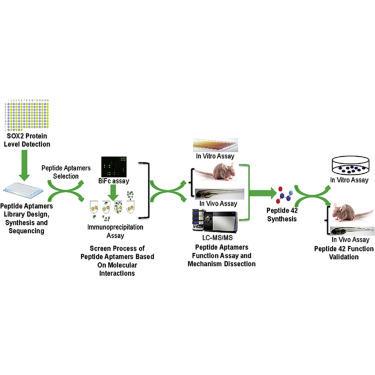当前位置:
X-MOL 学术
›
Mol. Ther.
›
论文详情
Our official English website, www.x-mol.net, welcomes your
feedback! (Note: you will need to create a separate account there.)
Targeting SOX2 Protein with Peptide Aptamers for Therapeutic Gains against Esophageal Squamous Cell Carcinoma.
Molecular Therapy ( IF 12.1 ) Pub Date : 2020-01-15 , DOI: 10.1016/j.ymthe.2020.01.012 Kuancan Liu 1 , Fuan Xie 2 , Tingting Zhao 3 , Rui Zhang 2 , Anding Gao 2 , Yunyun Chen 3 , Haiyan Li 4 , Shihui Zhang 5 , Zhangwu Xiao 6 , Jieping Li 7 , Xiaoqian Hong 3 , Lei Shang 3 , Weifeng Huang 8 , Junkai Wang 9 , Wael El-Rifai 10 , Alexander Zaika 10 , Xi Chen 11 , Jianwen Que 12 , Xiaopeng Lan 2
Molecular Therapy ( IF 12.1 ) Pub Date : 2020-01-15 , DOI: 10.1016/j.ymthe.2020.01.012 Kuancan Liu 1 , Fuan Xie 2 , Tingting Zhao 3 , Rui Zhang 2 , Anding Gao 2 , Yunyun Chen 3 , Haiyan Li 4 , Shihui Zhang 5 , Zhangwu Xiao 6 , Jieping Li 7 , Xiaoqian Hong 3 , Lei Shang 3 , Weifeng Huang 8 , Junkai Wang 9 , Wael El-Rifai 10 , Alexander Zaika 10 , Xi Chen 11 , Jianwen Que 12 , Xiaopeng Lan 2
Affiliation

|
Esophageal squamous cell carcinoma (ESCC) is a predominant cancer type in developing countries such as China, where ESCC accounts for approximately 90% of esophageal malignancies. Lacking effective and targeted therapy contributes to the poor 5-year survival rate. Recent studies showed that about 30% of ESCC cases have high levels of SOX2. Herein, we aim to target this transcription factor with aptamer. We established a peptide aptamer library and then performed an unbiased screening to identify several peptide aptamers including P42 that can bind and inhibit SOX2 downstream target genes. We further found that P42 overexpression or incubation with a synthetic peptide 42 inhibited the proliferation, migration, and invasion of ESCC cells. Moreover, peptide 42 treatment inhibited the growth and metastasis of ESCC xenografts in mouse and zebrafish. Further analysis revealed that P42 overexpression led to alternations in the levels of proteins that are important for the proliferation and migration of ESCC cells. Taken together, our study identified the peptide 42 as a key inhibitor of SOX2 function, reducing the proliferation and migration of ESCC cells in vitro and in vivo, and thereby offering a potential therapy against ESCC.
更新日期:2020-01-15











































 京公网安备 11010802027423号
京公网安备 11010802027423号